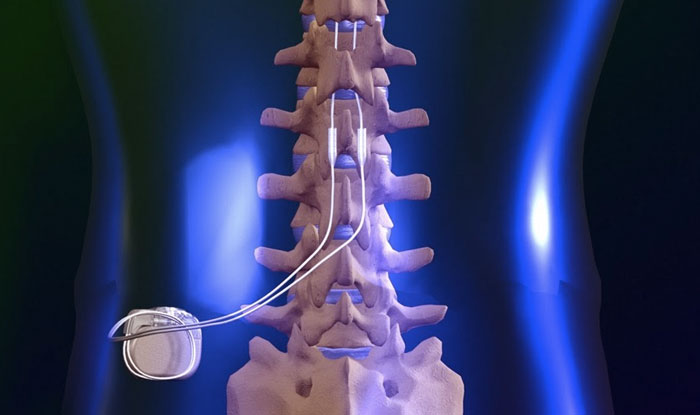MIS-Spinal Cord Stimulator

Spinal Cord Stimulator
A spinal cord stimulator, known as an SCS, uses electrical impulses to relieve severe, chronic pain within the back, arms and legs. This is an alternative option and indicated in patients who have diagnosis of chronic pain syndrome, failed back surgery syndrome, post-laminectomy syndrome, recalcitrant nerve pain due to neuropathy, nerve pain from spinal pathologies but not a candidate for major surgery or repeated surgeries.
The stimulator is controlled remotely with a wireless device, allowing the patient to turn it on or off, adjust the stimulation power level and switch between programs. It is believed that the success within this minimally invasive method of pain management stems from the electrical pulses generated, which prevent pain signals from being received by the brain. The pulses interfere with certain signals that make you experience pain and can even block them entirely from the brain’s perception.
Patients are required to undergo an initial trial with an external spinal cord stimulator. If the trial is successful, a stimulator is permanently implanted beneath the patient’s skin in the buttocks or the abdomen. A team of spine surgeon and pain management physicians will carefully evaluate each patient to determine the appropriateness of a spinal cord stimulator implant. Typically, ideal candidates are those who suffer from neuropathic pain, severe and chronic syndromes, debilitating nerve-related pain and/or those who have experienced the failure of conservative treatment options.
Our Treatment Approach
The first step in receiving a spinal cord stimulator implant is to undergo a trial implantation. Typically, the trial will involve the following:
- The injection site is anesthetized and one or more insulated wire leads are inserted through an epidural needle or small incision into the space surrounding the spinal cord.
- Electrodes located at the end of the lead produce electrical impulses that stimulate the nerves and block pain signals in the brain. The leads are attached to an external trial stimulator, which is typically used for about one week to determine its effectiveness on the patient’s pain.
- The patient will provide feedback to help the physician best determine where to place the stimulators to most effectively block out pain.
Once the trial has been completed and a spine surgeon and a pain management physician have determined this is a viable course of treatment for you, permanent implantation will be performed under sedation or general anesthesia. The implant is positioned beneath the skin and the leads are connected to its battery. The electrical pulses are then programmed and controlled using a wireless external programmer for easy control.
At Microspine, Dr. T works closely with each patient to create the best treatment plan for their individual needs.
REQUEST APPOINTMENT
If you are suffering from low-back pain, neck pain, herniated disc, sciatica, pinched nerve and have been researching minimally invasive spine surgery as well as laser spine surgery, schedule an appointment to speak to Dr. T and Microspine Team today. Often, this procedure is covered by healthcare insurance.
REQUEST APPOINTMENT
If you are suffering from low-back pain, neck pain, herniated disc, sciatica, pinched nerve and have been researching minimally invasive spine surgery as well as laser spine surgery, schedule an appointment to speak to Dr. T and Microspine Team today.
Microspine
Office
14300 N Northsight Blvd, #213. Scottsdale, AZ 85260
Phone: 602-833-2141
Fax: 602-610-3878
Office hours M-F: 8 AM to 5 PM
By appointment only
Dr. T serves the areas of Anthem, Apache Junction, Avondale, Buckeye, CasaGrande, Cave Creek, Chandler, Flagstaff, Fountain Hills, Gilbert, Glendale, Goodyear, Laveen, Maricopa, Mesa, Paradise Valley, Payson, Peoria, Phoenix, Prescott, Prescott Valley, Queen Creek, Safford, SanTan, Scottsdale, Sedona, Showlow, Suncity, Suncity West, Tempe, Tucson, Yuma, and surrounding areas.
